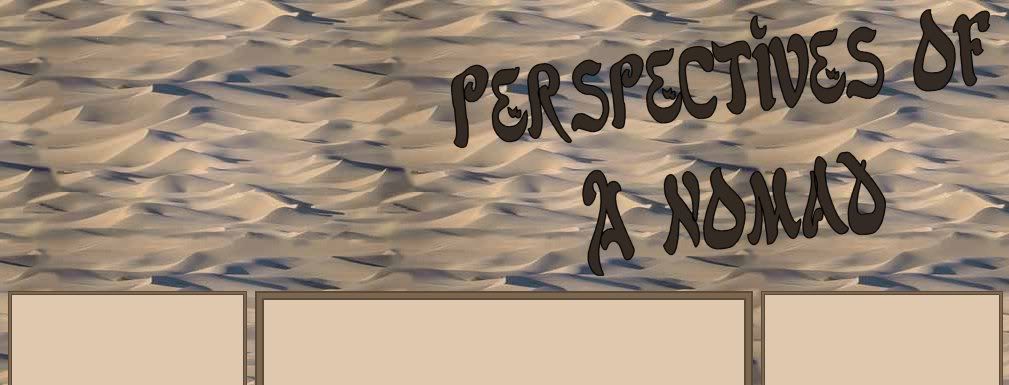

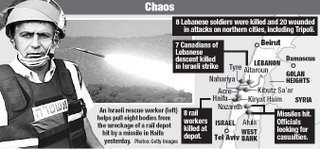
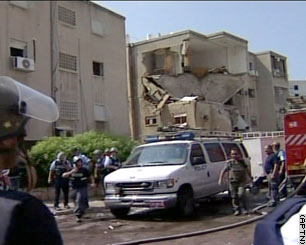 In Lebanon, Hezbollah has made the calculated move from Katyusha rockets to longer-range, more accurate and more powerful weapons supplied from Syria. The Katyushas were incapable of reaching the major Israeli cities, or the Israeli warship attacked Saturday. But the Syrian made missiles are able to hit cities like Haifa, 3rd largest city in Israel that was hit multiple times Sunday, and other cities like Afula, Sefad, Tiberias, and Northern Nazareth. Left you see a Haifa building after being hit by a Hezbollah missile.
In Lebanon, Hezbollah has made the calculated move from Katyusha rockets to longer-range, more accurate and more powerful weapons supplied from Syria. The Katyushas were incapable of reaching the major Israeli cities, or the Israeli warship attacked Saturday. But the Syrian made missiles are able to hit cities like Haifa, 3rd largest city in Israel that was hit multiple times Sunday, and other cities like Afula, Sefad, Tiberias, and Northern Nazareth. Left you see a Haifa building after being hit by a Hezbollah missile.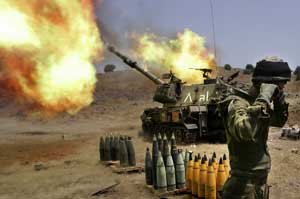 However, the strikes on Upper Nazareth, boyhood home to Jesus, is a direct indicated of the limitations still faced by the weapons being used by Hezbollah today. The city is largely comprised of Muslims, with many Christians living there as well. While there is a large market where many Israelis shop, few if any Israelis actually live in the city. It is an indicant of the lack of accuracy in the Syrian weaponry, and the desire for Hezbollah to spread chaos today, as opposed to utilizing a specific military plan to win this war.
However, the strikes on Upper Nazareth, boyhood home to Jesus, is a direct indicated of the limitations still faced by the weapons being used by Hezbollah today. The city is largely comprised of Muslims, with many Christians living there as well. While there is a large market where many Israelis shop, few if any Israelis actually live in the city. It is an indicant of the lack of accuracy in the Syrian weaponry, and the desire for Hezbollah to spread chaos today, as opposed to utilizing a specific military plan to win this war.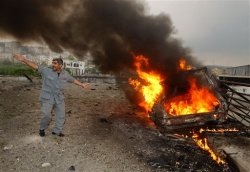 Israel’s moves have been more calculated, and follow a game plan that they have followed time and again. They began by blockading the country and attacking supply lines, making sure no weapons can go in or out of the region. Now they are attacking the weapons themselves, going after launchers and weapons stores, taking out the main instruments used by Hezbollah to attack Israeli towns. All this is done through the air.
Israel’s moves have been more calculated, and follow a game plan that they have followed time and again. They began by blockading the country and attacking supply lines, making sure no weapons can go in or out of the region. Now they are attacking the weapons themselves, going after launchers and weapons stores, taking out the main instruments used by Hezbollah to attack Israeli towns. All this is done through the air.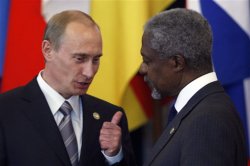 Already Kofi Annan and Tony Blair are discussing an international force for the region, and Vladimir Putin is considering contributing troops to such an effort. But don’t be surprised if those forces are only allowed to be implemented after Israel has achieved its objectives and created the buffer zone. At this point, perhaps both sides will agree to allow an international force to patrol that zone.
Already Kofi Annan and Tony Blair are discussing an international force for the region, and Vladimir Putin is considering contributing troops to such an effort. But don’t be surprised if those forces are only allowed to be implemented after Israel has achieved its objectives and created the buffer zone. At this point, perhaps both sides will agree to allow an international force to patrol that zone.technorati tags: Middle East, Lebanon, Israel, Gaza, Hezbollah, Katyusha, Syria, Iran, Afula, Sefad,, Tiberias, Nazareth, Haifa, Tony Blair, Kofi Annan, Vladimir Putin
Posted by Scottage at 10:54 AM / | |
